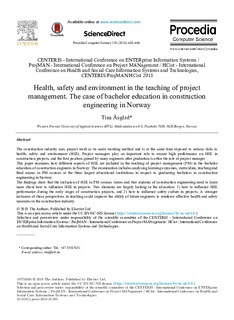Health, safety and environment in the teaching of project management. The case of bachelor education in construction engineering in Norway
Journal article, Peer reviewed
Published version

Åpne
Permanent lenke
http://hdl.handle.net/11250/2583440Utgivelsesdato
2018Metadata
Vis full innførselSamlinger
Originalversjon
Åsgård, T. (2018). Health, safety and environment in the teaching of project management. The case of bachelor education in construction engineering in Norway. Procedia Computer Science, 138, 688-696. 10.1016/j.procs.2018.10.091Sammendrag
The construction industry uses project work as its main working method and is at the same time exposed to serious risks to health, safety and environment (HSE). Project managers play an important role to ensure high performance on HSE in construction projects, and the first position gained by many engineers after graduation is often the role of project manager. This paper examines how different aspects of HSE are included in the teaching of project management (PM) in the bachelor education of construction engineers in Norway. The examination includes analysing learning outcomes, curriculum, teaching and final exams in PM courses at the three largest educational institutions in respect to graduating bachelors in construction engineering in Norway. The findings show that the inclusion of HSE in PM courses varies and that students of construction engineering need to learn more about how to influence HSE in projects. Two elements are largely lacking in the education: 1) how to influence HSE performance during the early stages of construction projects, and 2) how to influence safety culture in projects. A stronger inclusion of these perspectives in teaching could improve the ability of future engineers to reinforce effective health and safety measures in the construction industry.
